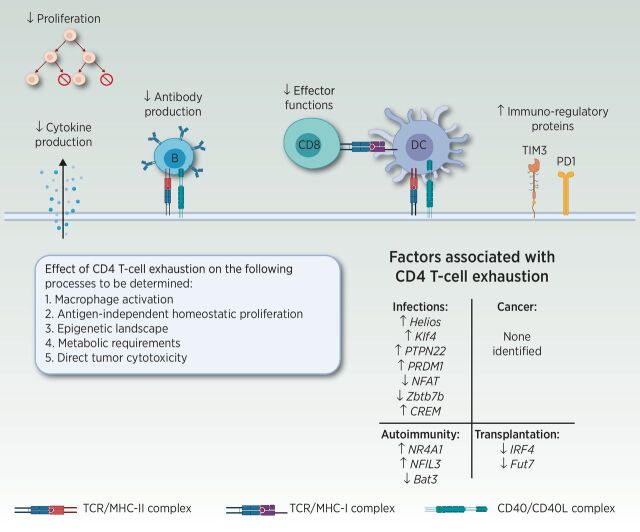Figure 2.
Consequences of CD4 T-cell exhaustion on CD4 Th functions. Although the details of CD4 T-cell exhaustion remain to be deciphered, negative effects on proliferation, cytokine production, B-cell help, and CD8 effector functions have been reported. In addition, CD4 T cells with reduced effector functions upregulate immune-regulatory proteins, such as T-cell immunoglobulin and mucin domain-3 (TIM3) and PD-1, paralleling phenotypes observed in exhausted CD8 T cells. Whether CD4 T-cell exhaustion negatively impacts macrophage activation and direct tumor cytotoxicity remains to be determined. Further research is required to determine whether loss of antigen independent homeostatic proliferation and alterations in epigenetic and metabolic profiles are features of exhausted CD4 T cells, similar to exhausted CD8 T cells. Abbreviations: Bat3: human leukocyte antigen B (HLA-B)–associated transcript 3; CREM: CAMP responsive element modulator; Fut7: fucosyltransferase 7; IRF4: interferon regulatory factor 4; Klf4: Krüppel-like factor 4; NFAT: nuclear factor of activated T cells; NFIL3: nuclear factor, interleukin 3 regulated; NR4A1: nuclear receptor subfamily 4 group A member 1; PRDM1: PR/SET domain 1 (encodes Blimp1); PTPN22: protein tyrosine phosphatase, non-receptor type 22; Zbtb7b: zinc finger and BTB domain containing 7B (encodes ThPOK). Adapted from an image created with BioRender.com.

